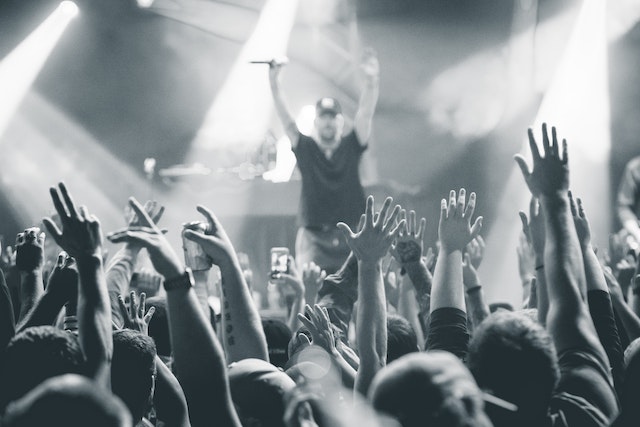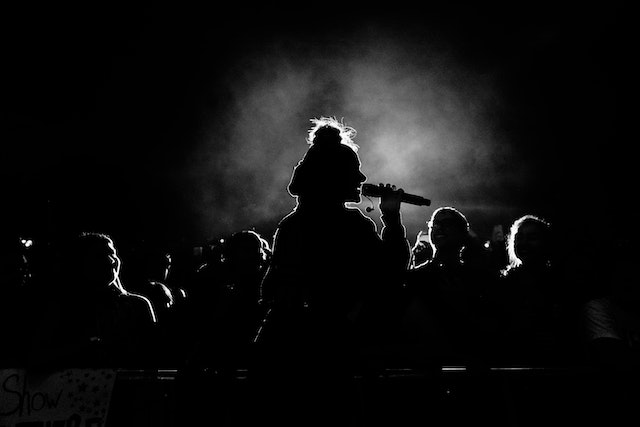BecomeSingers is reader-supported. When you buy through links on our site, we may earn an affiliate commission. Learn More
There’s nothing worse than feeling utterly nervous and anxious before an event in your life that should be memorable, exciting, and overall a happy experience. You could be a musician who’s been waiting for this gig for the past months, a public speaker who’s made it their job to give speeches, a comedian, an influential speaker; whatever your profession is, going on stage feels like hell to you. Your body is badly reacting to even the thought of being up on stage in front of hundreds if not thousands of people. So how do we fix this? Is it possible for someone to get over their stage fright? Well, let’s find out.

Many celebrities and singers suffer from stage fright, and it’s more common than people think. Did you know that Adele was so nervous at one of her shows in Amsterdam before going on stage that she escaped out of the fire exit? The time she projectile vomited on someone before a performance in Brussels. Rihanna, on the other hand, takes a shot before every show to calm her nerves and ease her anxiety. Harry Styles, too, went through a phase of throwing up before he went on stage. It’s very common to experience stage fright. And just because it involves public performances, you shouldn’t let it force you to choose another career path and stop you from following your dreams. Although it is a terrible thing to deal with, there are a few exercises and methods that will significantly help you overcome your fear and, hopefully, help you give the performance of a lifetime.
Table of Contents
What is Stage Fright?
Performance anxiety, commonly known as stage fright, is a state of anxiety or fear which happens when someone is required to perform in front of a live audience. This affects numerous people, including politicians, actors, and celebrities, who continue to have terrible symptoms even after years of experience. Most people struggle in silence while trying to maintain their composure, while others deal with symptoms like nausea, heavy perspiration, upset stomachs, etc.
To help you overcome stage fright when singing, let’s look at the causes of this terrible fear and the various symptoms that come with it.
One of the main reasons for having stage fright is the idea of being the center the attention and having all eyes on you. Even if you’ve just spent the past month practicing to perfect your performance, stage fright might induce various negative thoughts, make you doubt yourself, and feel attacked. This is when your body will react to this situation very similar to what it would if you were actually attacked. Your body’s “fight-or-flight” response will get triggered. And you will face symptoms that resemble those that appear when you are in real danger.
Also Read: How To Relax Your Throat When Singing
How does stage fright start showing up?
Hours or minutes before your live performance, different symptoms will start creeping up. Symptoms include increased heart rate, dry mouth, trembling or shaking, nausea, sweaty hands or feet, inability to speak, cold extremities, tight throat, stomach ache, and tingling sensation in various parts of your body.

And even though you’re not being physically attacked, you will feel mentally attacked by your own mind and thoughts like “What if I’m not good enough?”, “what if I mess up?”, “what if I forget the lyrics?”, “what if I get booed off stage?”, “what if my voice cracks?” Your brain will start racing and processing these toxic thoughts so quickly that it will cause physical symptoms and despair.
How to get over stage fright while singing
Remember that just because you’re experiencing stage fright doesn’t mean you’re not a great or a talented singer or that you’ve come unprepared for your show. You should continuously remind yourself that stage fright is completely normal because if Adele the singing goddess, can feel anxious and scared before performing, so can 99.99% of other singers out there.
However, there are a few techniques to help get through that dark phase and perform confidently in front of a live audience. Let’s address the best 7 exercises to practice;
▪ Preparation.
it’s normal to feel anxious and scared if you feel like you’ve come unprepared to your show. It’s crucial that you perfect your songs and repeat them over and over again to the point where you no longer have to think about them, and they come naturally to you. Whether concerning melody or lyrics, make sure you 100% have it completely nailed.
▪ Do Breathing Exercises.
Make yourself as comfortable as you can. If you’re sitting, place your arms on the chair and both feet flat on the ground. If you’re standing, place your feet hip-width apart.
Breathe in gently and deeply while counting steadily from 1 to 5. Breathe in through your nose and out through your mouth, letting it flow out gently, counting from 1 to 5 again.
Repeat this for 5 minutes or more if you feel it’s necessary.
▪ Avoid stimulants like caffeine (coffee, energy drinks, etc.)
Caffeine, especially in large doses, will cause over-stimulation, resulting in a rapid heart rate, anxiety, panic, headaches, stomach cramps, and many more unpleasant side effects that’ll just work you up and worsen your stage fright and anxiety.
▪ Tell yourself you’re excited, not scared.
Fear activates the hypothalamus the same way as excitement, triggering the same physiological reaction in both emotions. It releases stress hormones like cortisol and adrenaline, making your blood pressure and heart rate increase, and you start breathing faster. And since your brain reacts similarly to both feelings, just convince yourself that you’re excited and pumped for the show rather than anxious and scared.
Read More: Breathing Control Exercises and Techniques For Singer
▪ Don’t obsess about being perfect, and just have fun.
Having stage fright can make you lose sight of why you chose that career path in the first place—your love and passion for singing.
Have fun, don’t take anything personally, pretend you’re just performing for your friends in your bedroom, and tell yourself it’s okay to make mistakes. Even the biggest artists in the industry still make mistakes. It’s normal to mess up. And if you do mess up, simply laugh at yourself. That will actually make you look more confident and at ease with yourself, which will trick the audience into believing that you don’t really care about their thoughts and opinions, which is exactly what we want.
You can also wear good clothing to reduce your stage performance anxiety.
▪ Meditate.
Meditation has plenty of health benefits. It controls anxiety, gives you a sense of calmness, improves sleep quality, helps reduce digestive problems, headaches, muscle tension, and many more. Try to include meditation in your daily life. It will surely relieve stress and slowly help you overcome your stage fright.
▪ Fixate on something or someone.
If looking at people’s faces in the crowd makes you nervous, simply look aside and try to fixate on something or someone who will calm you down. It could be an object or a person. It could be an empty chair in the corner, a dimmed light at the back of the stage, or something else entirely. If your best friend’s face or any familiar face calms you down, keep looking at them through your entire performance and act as if they are the only audience member you are playing for. Just look for your “comfort spot.” It usually doesn’t take more than a few seconds to find.
Extra tips: How to deal with stage fright while singing

- It’s preferable to eat at least 2 hours before your show and not a minute sooner. That way, if you feel nauseous before your performance, there’s less chance of you throwing up.
- Make sure you organize your set list, starting with the easiest songs to perform. That way, you will use these songs as “practice songs” until you reach the harder, more challenging ones.
- Always ask your family and friends for feedback days before the show. You don’t want to be believing you’re Beyoncé when you actually have a less than mediocre voice. Always ask your friends and family for their honest opinion. Once they assure you that you have a great voice and are leaving your doubts behind, that confidence boost will help you tremendously before you go on stage.
- A lot of people imagine their audience naked because it makes them seem vulnerable and less threatening, which will calm your nerves and make you feel better.
- Remember that the crowd is there to have fun. They’re not there to judge you and certainly don’t want to see you fail. Just have fun and do what you love to do. At the end of the day, no one cares if you make a mistake. People are there to waste some time for a couple of hours before returning to their normal lives. So don’t take yourself too seriously and have fun.
Read More: Types of Live Autotune Hardware & Equipment
Final Summary
Although stage fright is one of the most intense types of anxiety, it is totally natural to experience it and should not prevent you from pursuing your dreams and landing the job of your dreams. What matters is that you take steps to overcome your fear and learn how to cope with it. We highlighted a number of useful techniques today to help you get through your live performances, and it’s important that you test every single one of them and try to apply as many of them to your daily life.
If you feel like you still experience an overwhelming feeling of nervousness and anxiety before you go on stage, to a point where you feel like it’s more of a phobia than a type of anxiety, even after trying our techniques for a few months, it’s best to check out a therapist that will help you overcome your fears. The most crucial step is to talk to someone and admit that you have a stage fright problem, rather than hide it and keep your feelings bottled up. Talk to a friend or a family member, then find a therapist with whom you feel comfortable discussing this issue. Even though stage fright is not typically considered a phobia, it may be classified under “glossophobia” (fear of public speaking), which is a form of social phobia and be treated as such.
All you have to do is talk to someone about it, anyone at first, and we promise that it’s all uphill from there.





